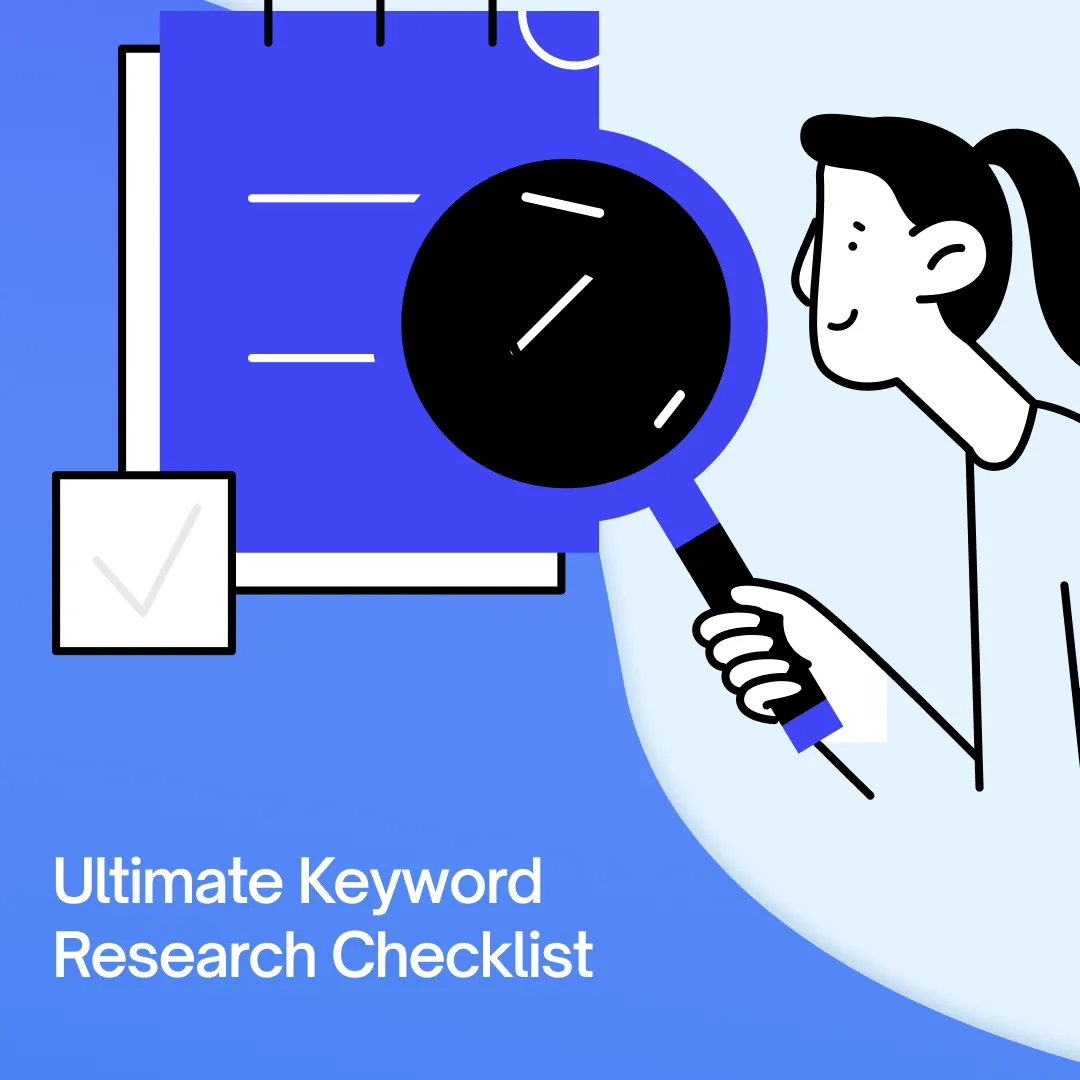LLMs are changing how people find and trust content. Relying on traditional SEO alone isn’t enough anymore. AI-powered search engines like ChatGPT and Google Gemini now pull information into instant summaries, and are even skipping the click-through to your website.
That’s why you need fresh strategies to rank in AI search.
In this post, we’ll walk you through 10 powerful LLM optimization tools to track AI-generated answers, monitor brand mentions, and boost AI visibility across AI search results.
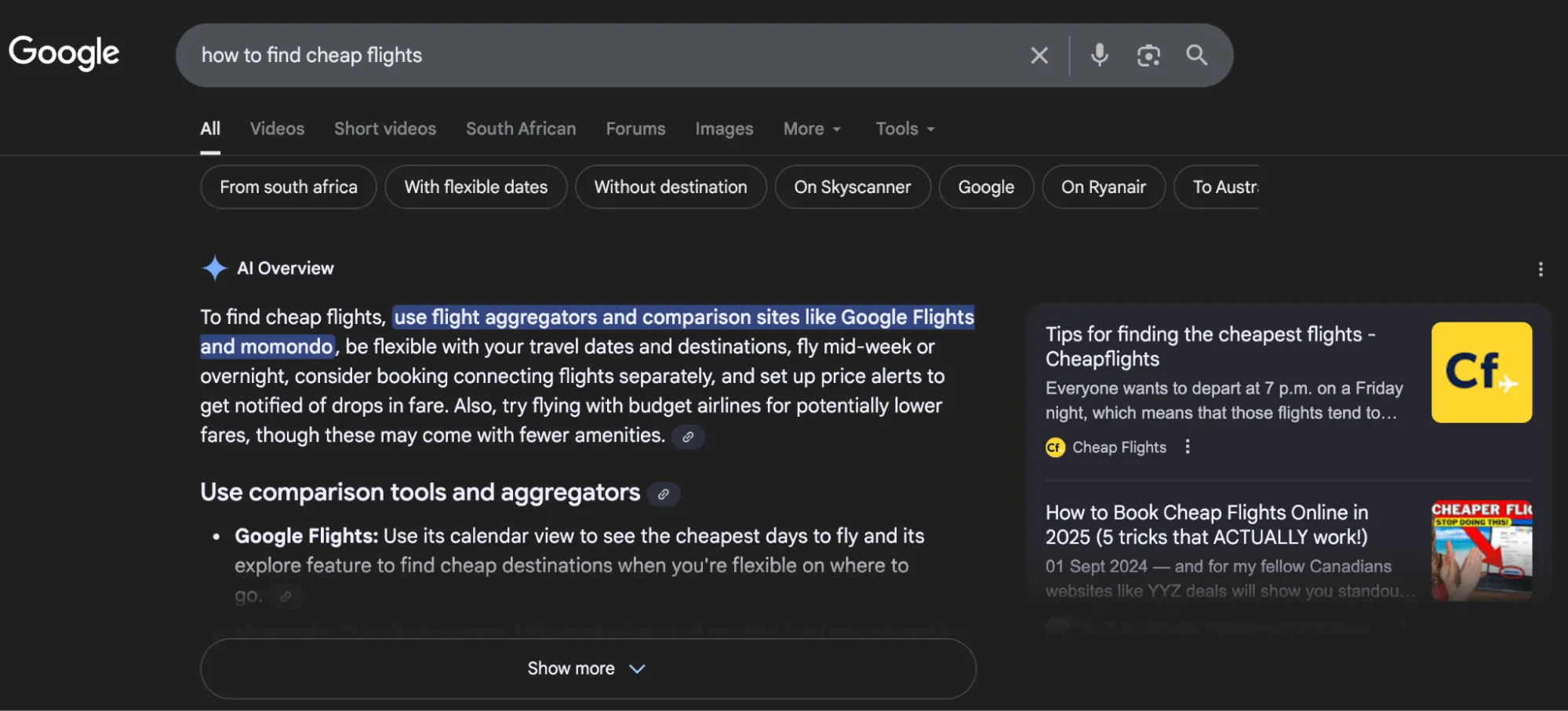
Before we start, check out this video to learn more about LLM optimization:
Now, let’s dive in:
What Are LLM Optimization Tools?
LLM optimization tools track and improve your AI search visibility, so basically any software that helps optimize how content interacts with Large Language Models (LLMs).
An AI SEO toolkit could include Generative Engine Optimization (GEO) platforms, but also things like prompt optimization, fine-tuning, or API-focused tooling. For example, GEO platforms refer to tracking and improving visibility inside generative engines like ChatGPT, Gemini, Perplexity, etc.
Instead of only tracking keyword rankings or search volume, LLM optimization tools go deeper. They show how your brand or prompts appear inside AI-generated answers across AI-powered search engines like the ones we mentioned above.
One example is the Semrush Enterprise AIO tool, which tracks your presence across all the major AI platforms.
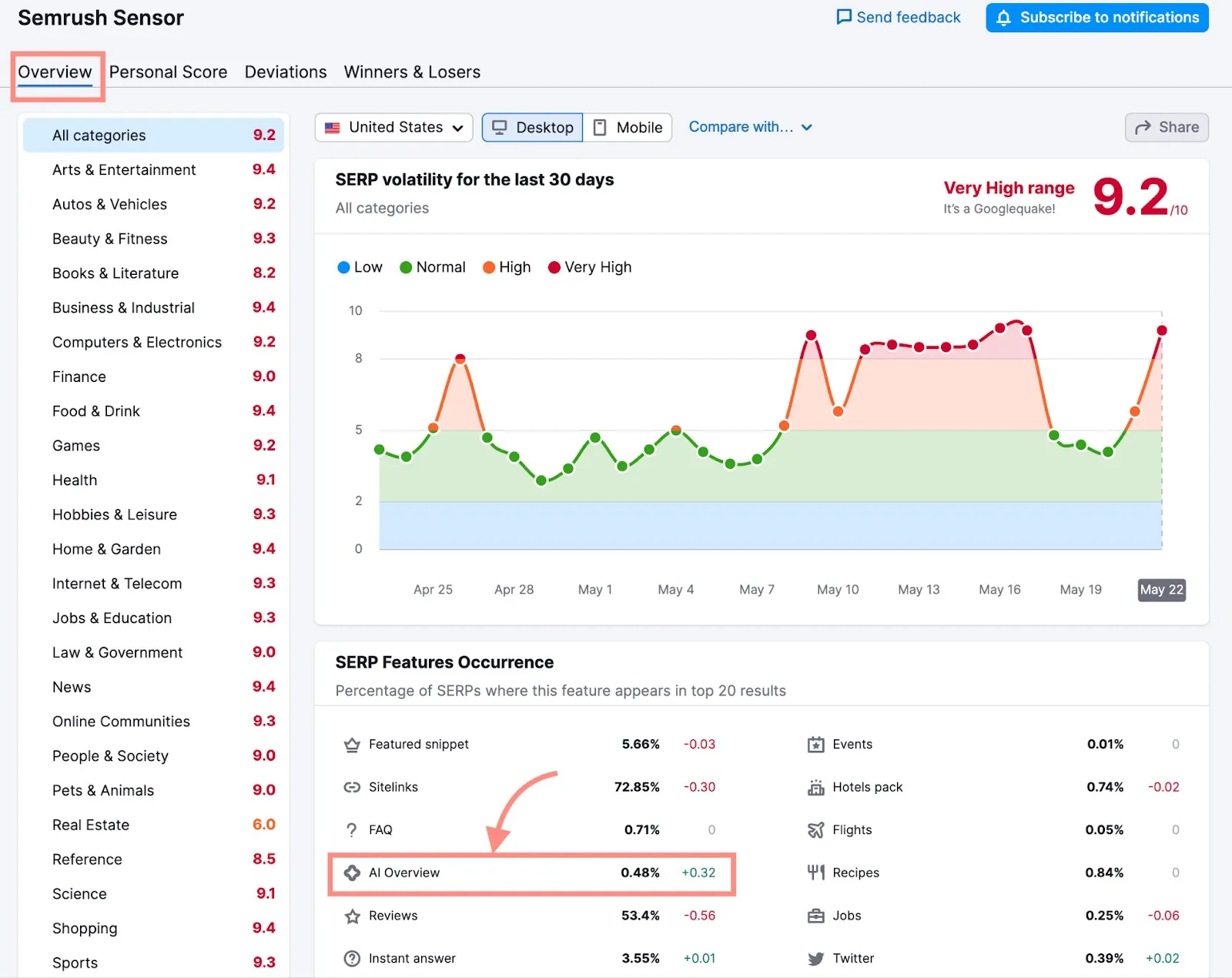
Some standout features include:
- Prompt-level insights and tracking – e.g. an SEO team can see if “best project management tools” prompts in ChatGPT surface their SaaS product, or skip it in favor of competitors.
- Citation source tracking and brand mentions – a PR manager might catch that Gemini summarizes their research report without showing a link. For instance, a Wired reporter discovered that Google’s AI Overviews copied passages from their original article almost verbatim, but the attribution was buried in a footnote alongside other sources.
Side note: Of course, you can’t force Gemini to cite you. At best, you can document it and use that as leverage for PR outreach, DMCA claims, or internal reporting. You can also improve your chances to get a citation by publishing findings in crawlable, well-structured formats (clean HTML, schema markup), earning backlinks, and reinforcing brand-topic associations.
- Sentiment/ hallucination detection – healthcare brands can quickly flag if Perplexity, for example, misstates dosage details tied to their name, so you can respond quickly. There’s no built-in fix, but you can:
- Escalate internally: Alert your medical, regulatory, or legal teams so they can assess risk and prepare an official statement if needed.
- Run corrective campaigns: Publish a clarifying blog post, press release, or social media update that states the correct dosage and positions your brand as proactive about patient safety.
- Reinforce correct data: Update your site with structured content (FAQ pages, schema markup, medical disclaimers) so crawlers have a clear, authoritative reference.
- Engage external channels: If misinformation spreads, reach out to journalists, forums, or healthcare portals to correct the record.
- Escalate internally: Alert your medical, regulatory, or legal teams so they can assess risk and prepare an official statement if needed.
- Multi-model tracking – content marketers can compare how the same query performs in ChatGPT vs. Google AI Overviews vs. Claude, revealing gaps in regional or platform-specific visibility.
In other words, your goal should not be to simply track mentions but also to shape how you’re represented across the AI search landscape.
Think of these tools as a Search Console for the AI era. But, instead of clicks or impressions, they report on presence, reliability, and representation in AI search results.
Why Are LLM Optimization Tools Important?
In the age of AI-powered search engines, your content can fuel AI-generated answers without driving clicks or even showing your website. By 2024, nearly 60% of Google searches ended without a click as AI Overviews and answer boxes gave instant summaries.
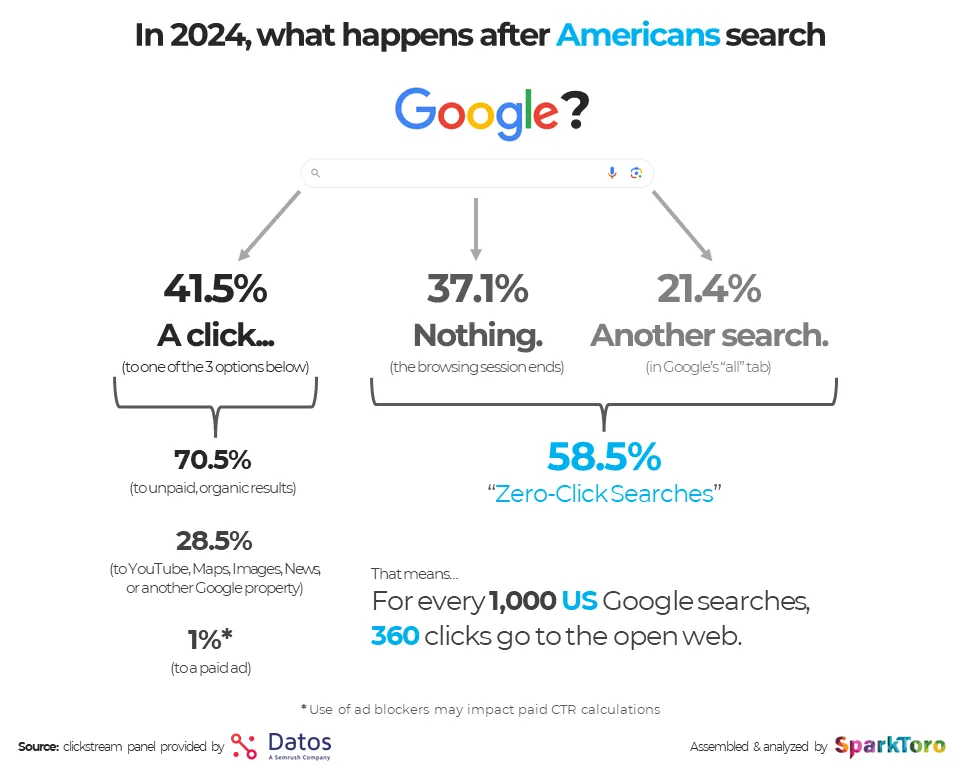
That’s a big shift from traditional search engine optimization, which leans on keyword search volume and rankings.
This is where LLM optimization tools step in.
They show you how large language models are actually using your content. These tools track brand mentions, monitor search visibility in AI search results, and reveal whether your work is cited, summarized invisibly, or misrepresented. You’ll also see content gaps where your brand isn’t showing up at all.
Different teams benefit in different ways:
- SEO teams use insights to refine content strategy, plug gaps, and strengthen structured data.
- PR teams monitor brand mentions and brand sentiment to react quickly if an AI answer gets it wrong.
- Content marketing teams leverage these insights to sharpen messaging and ensure visibility across ChatGPT, Gemini, and other AI platforms.
Real-life example: Studies from Seer Interactive show that nearly 65% of AI “bot hits” cite content published within the past year, emphasizing the importance of freshness. LLM optimization tools help teams see when their newer content is picked up in ChatGPT or Gemini answers, and adjust publishing cadence to stay visible. For SEO teams, that’s a signal to keep content updated; for PR teams, it’s proof that timely reports are more likely to earn attribution.
The result? These tools act like AI visibility dashboards, protecting your authority today while future-proofing your reputation in AI search.
That brings us to the next point: choosing the best LLM optimization tools. Let’s see how they stack up against each other.
Tool Comparison Snapshot
LLM Optimization Tools Review
Which platforms actually help you track AI search visibility and improve performance across AI-powered search engines? We’ve tested the leading options, and here’s how they stack up.
1. Nightwatch
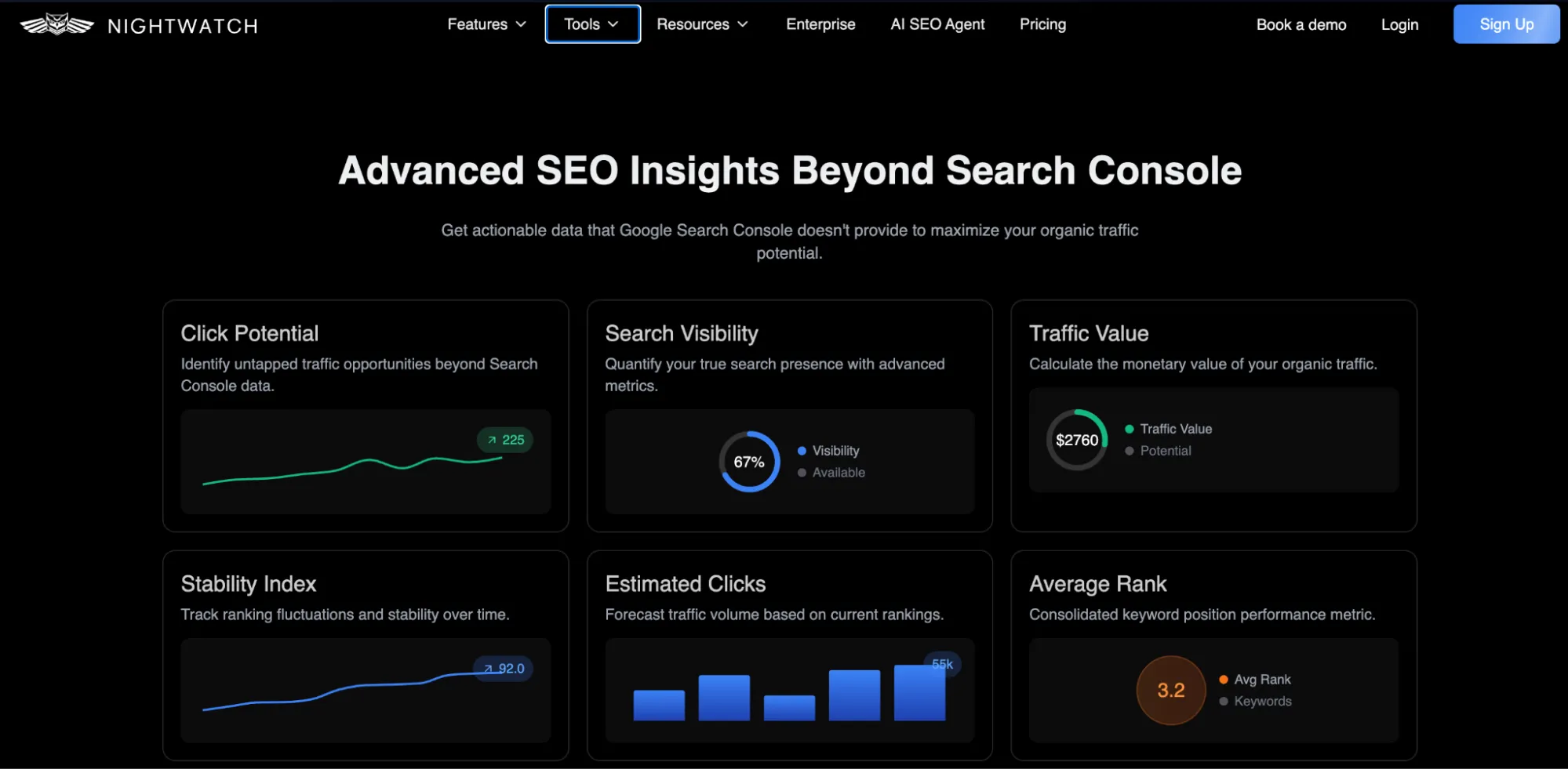
Best for: Hybrid tracking across search engines and AI search visibility.
Nightwatch bridges traditional search engine optimization with modern LLM optimization. While many tools focus only on AI-generated answers, Nightwatch tracks SERP rankings alongside AI-powered search engines like ChatGPT, Claude, and Google AI Overviews. This makes it ideal for SEO teams moving from classic dashboards to AI visibility dashboards.
- Key features: Prompt tracking, citation source tracking, brand mentions, structured data insights, stability index, estimated clicks
- Use case: A SaaS company tracking “SOC 2 compliance checklist” can monitor both keyword rank drops and whether ChatGPT still cites their content.
- Pricing: From $32/month for 250 keywords; 14-day free trial.
Pros:
- Hybrid SERP + LLM view
- Affordable entry point
- API + alerts
Cons:
- Limited LLM coverage compared to Semrush AIO
- Lighter on sentiment analysis than Peec AI
Insider tip: Add schema markup to pages. Nightwatch has shown brand mentions becoming more consistent in AI answers after structured data updates.
2. Peec AI
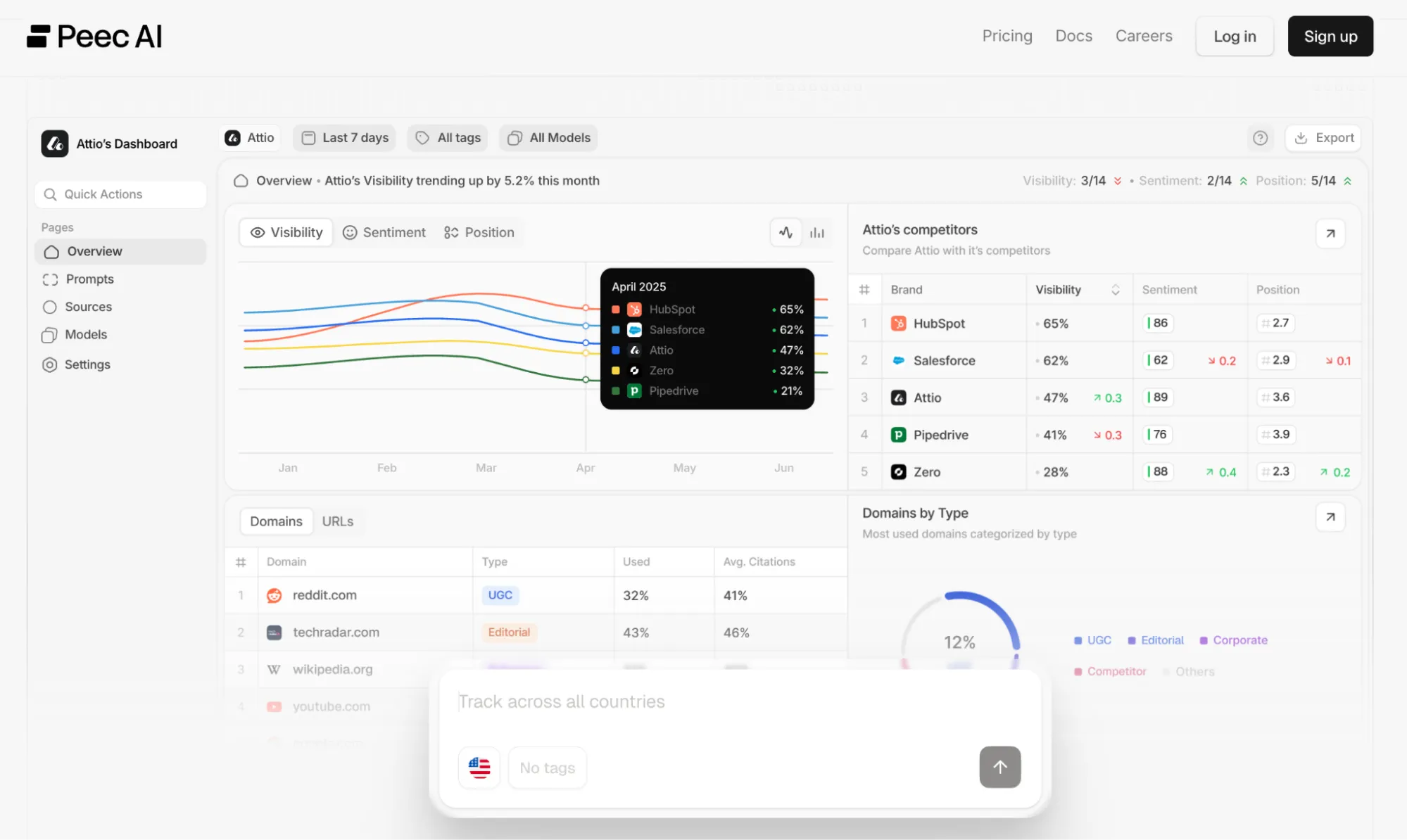
Best for: Regional benchmarking and Generative Engine Optimization (GEO).
Peec AI is built for agencies running campaigns across markets. Its standout feature is share of voice tracking. This allows you to benchmark your AI search visibility across AI platforms like ChatGPT, Gemini, Claude, and Perplexity.
- Key features: Prompt tracking, brand mentions, regional filters, CSV/API exports
- Use case: A global e-commerce brand can compare mentions in French vs. German AI answers and adjust content strategy.
- Pricing: From €89/month; enterprise >€499.
Pros:
- Strong multi-market coverage
- Advanced exports & white-label reports
- Great for competitor analysis
Cons:
- Pricier than tools like Otterly AI
- No hybrid SERP view like Nightwatch
Insider tip: Use regional reports to spot weak brand sentiment. Agencies have refined content briefs and boosted visibility scores in Gemini within one quarter.
3. Profound
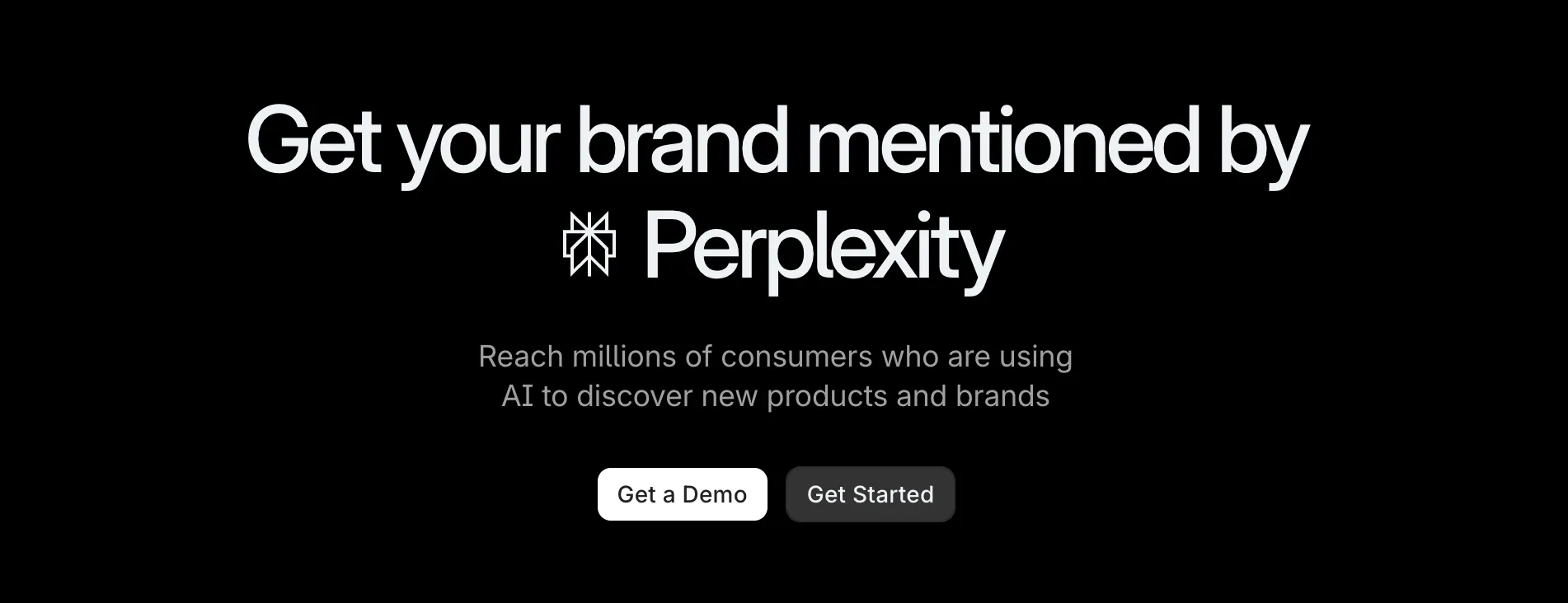
Best for: Enterprise-grade AI visibility dashboards.
Profound offers the widest coverage. This includes tracking ChatGPT, Gemini, Perplexity, Google AI Overviews, Microsoft Copilot, and more. Its unique edge? Conversation-level insights. You don’t just see where your brand appears in AI answers. You also see context, tone (via intent & sentiment), and broader visibility trends over time.
Metrics include number of conversations, referrals from AI search, AI traffic percentage, share of voice, and visibility score.
You can even use it to create AI-optimized content, with dozens of templates designed to maximize citations.
- Key features: Prompt monitoring, citation logs, share-of-voice, sentiment analysis, conversation insights, free templates
- Use case: A cybersecurity firm can check if ChatGPT positions it as a leader or if competitors dominate AI narratives.
- Pricing: From $499/month for ~200 prompts; scales enterprise.
Pros:
- Broadest LLM coverage
- Advanced sentiment analysis
- Enterprise-ready integrations
Cons:
- Steep cost
- Complex UI compared to other tools like Otterly AI
Insider tip: Pair Profound’s citation logs with Google Search Console and link building. When AI mentions you without backlinks, reclaim them to boost both traffic and AI search visibility.
4. Rankscale AI
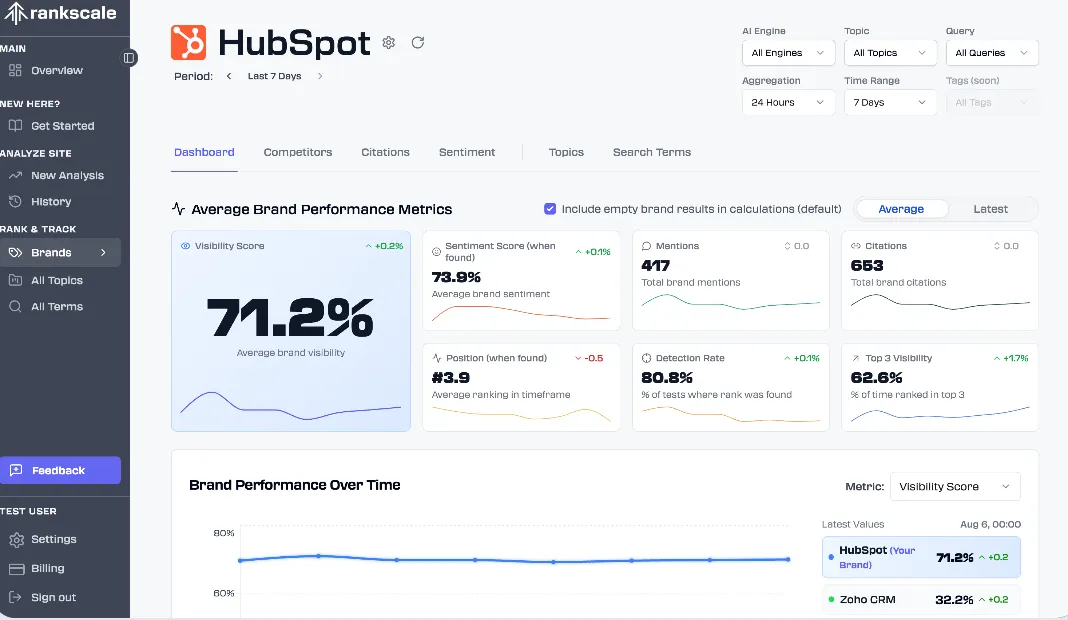
Best for: Agencies and teams on a budget.
Rankscale AI makes LLM optimization accessible with plans starting at just €20/month. It aims to simplify AI visibility tracking. This isn’t done with overwhelming dashboards, but by focusing on essential metrics, benchmarking, and audit insights. The tool monitors AI visibility across multiple engines such as ChatGPT, Perplexity, Claude, and Google AI Overviews. You can also audit your site to see how AI perceives your content.
- Key features: Multi-engine visibility tracking, citation analysis, competitor benchmarking, sentiment analysis, website/AI readiness audits
- Use case: A boutique digital marketing agency can see how often their clients are cited in AI answers compared to competitors, without paying enterprise-level fees.
- Pricing: From €20/month; agency-friendly tiers.
Pros:
- Affordable entry point
- Covers multiple clients easily
- Clear visibility score reporting
Cons:
- Limited global coverage
- Basic sentiment detection compared to Profound
- Fewer integrations than Peec AI
Insider tip: Pair Rankscale AI with Google Keyword Planner or Google Search Console to uncover content gaps and fuel briefs that improve AI search results mentions.
5. Scrunch AI
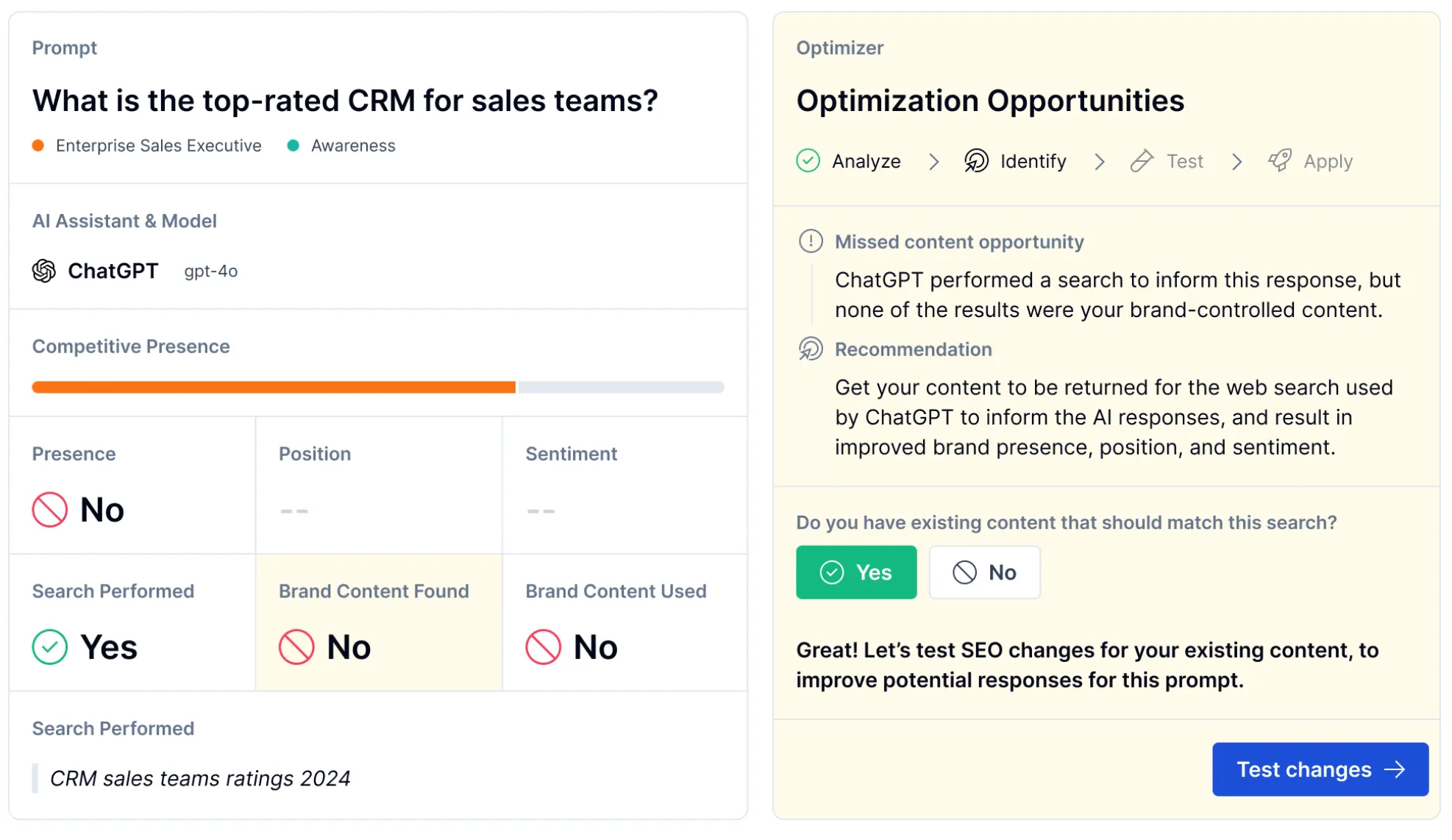
Best for: Reputation management and misinformation detection.
Scrunch AI is built for PR teams and enterprises worried about brand sentiment in AI-generated answers. Unlike Rankscale, which emphasizes affordability, Scrunch AI is more expensive. However, it specializes in spotting hallucinations, misattributions, and misinformation across ChatGPT, Gemini, Perplexity, and Meta AI. It also offers a novel “Agent Experience Platform” (AXP) aimed at optimizing how AI agents consume your content.
- Key features: Brand mention & sentiment monitoring, error/misattribution detection, citation analysis, competitor benchmarking, Agent Experience Platform (AXP) for AI-optimized content delivery
- Use case: A healthcare brand can monitor whether Gemini is summarizing medical information accurately or issuing risky hallucinations.
- Pricing: From $300/month for 350 custom prompts.
Pros:
- Strong on misinformation detection
- Great for PR and brand trust
- Enterprise-grade insights
Cons:
- Higher starting cost than Rankscale or Otterly AI
- May be overkill for SMBs
- Lacks hybrid SEO + AI view like Nightwatch
Insider tip: Brands use Scrunch’s alerts as triggers for media requests and expert commentary outreach, turning risks into link bait opportunities.
6. Keyword.com
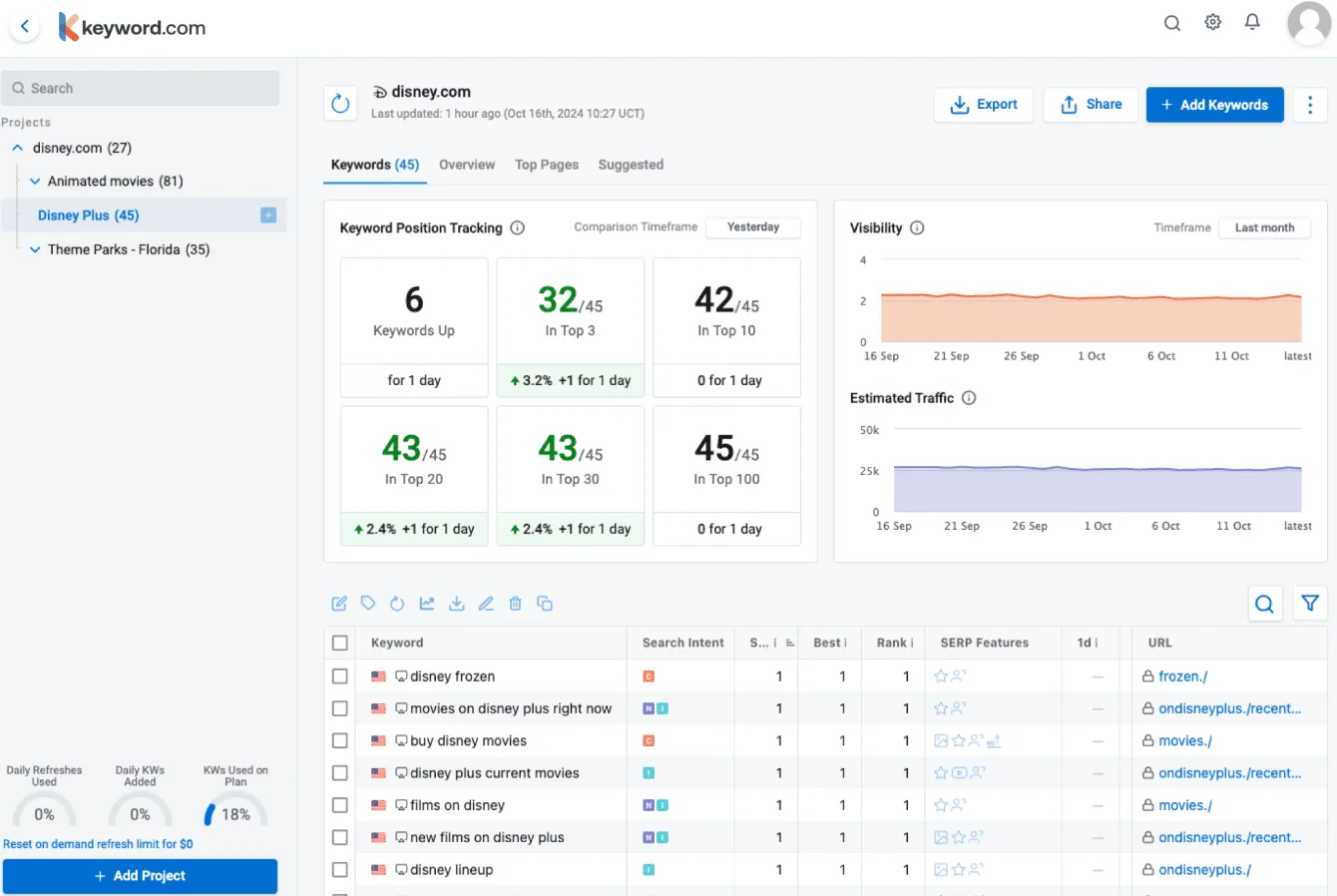
Best for: SEO teams linking rankings with AI visibility.
Known as a traditional competitor analysis tool, Keyword.com now bridges SERPs monitoring with AI search visibility. Unlike Scrunch (PR-focused), Keyword.com shows how your keyword rankings line up with AI mentions across ChatGPT, Claude, Gemini, and Google AI Overviews.
- Key features: Keyword + AI overlays, competitor benchmarking, citation tracking, visibility scores, 3rd party verification for every keyword, keyword discovery, Google maps tracking
- Use case: A SaaS brand tracking “project management software” can see if ranking content is cited in AI answers or lost in AI summaries.
- Pricing: From $3/month.
Pros:
- Combines SERP + AI visibility
- Affordable and SEO-friendly
- Strong competitor benchmarking
Cons:
- Limited exports compared to Peec AI
- Not designed for misinformation alerts like Scrunch
- Lighter sentiment analysis
Insider tip: Pair with Google Analytics 4 to spot when drops in organic clicks align with missing AI mentions, signaling when to refresh or add structured data.
7. Otterly AI
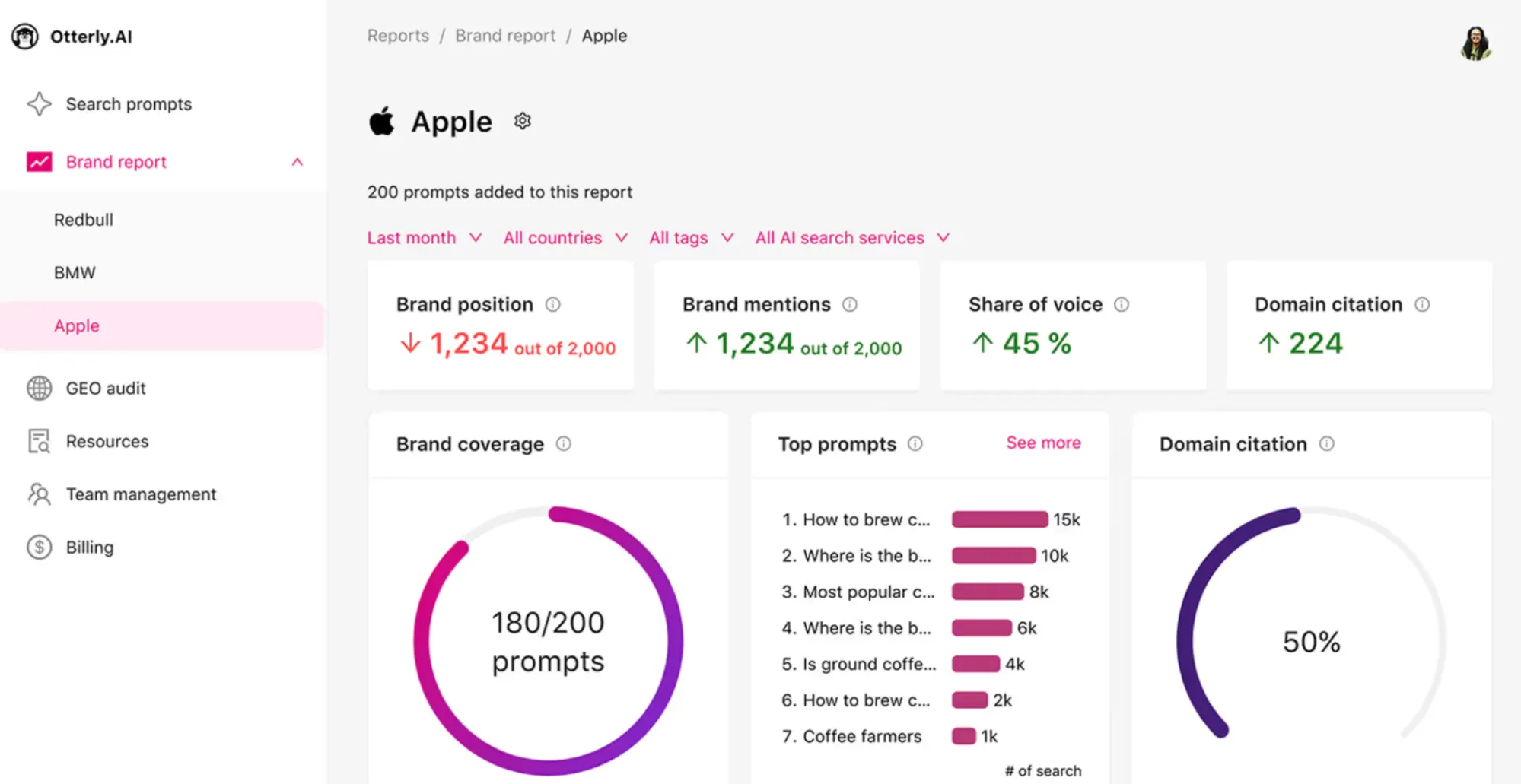
Best for: Small teams needing affordable GEO audits.
Otterly AI brings Generative Engine Optimization to startups and SMBs, with pricing from $29/month. Its standout feature is GEO audits, which evaluate your website for AI search readiness. It checks factors like structured data, metadata, llms.txt hints, and technical setup. This helps you understand how your pages might perform in AI-generated answers across ChatGPT, Gemini, Copilot, and Perplexity.
- Key features: GEO audits, search prompt identification, brand mentions, citation analysis, share-of-voice reports.
- Use case: A sustainability startup can test whether prompts like “eco packaging” return their content in ChatGPT, then apply Otterly’s audit fixes (like FAQ schema) to boost presence.
- Pricing: From $29–$39/month.
Pros:
- Affordable and beginner-friendly
- Actionable on-page audit recommendations
- Clear visibility tracking
Cons:
- Fewer exports than Peec AI
- Not built for multi-country reporting
- Shallower sentiment analysis than Profound
Insider tip: Teams have doubled their AI mentions in Perplexity within a month by fixing structured data issues flagged in Otterly audits.
8. Knowatoa AI
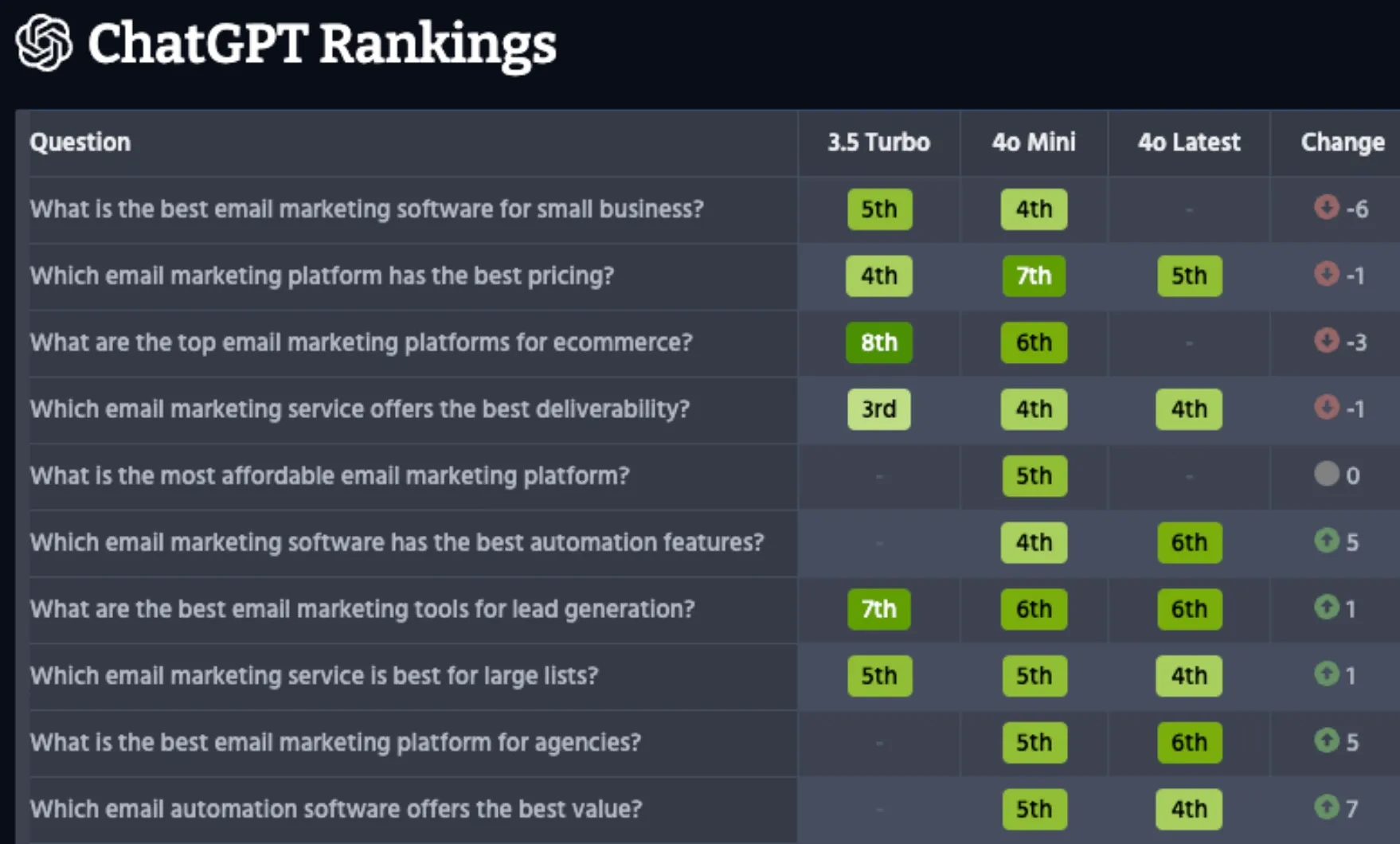
Best for: Finding content gaps through query-level tracking.
Knowatoa AI takes a Q&A-first approach to AI search visibility. Instead of only flagging AI mentions, it does rank tracking in AI search. Basically, it maps which search queries and questions trigger your brand across ChatGPT, Gemini, Claude, Perplexity, and Google AI Overviews.
- Key features: Query/question tracking, cross-model output comparison (versus your products/services), competitor benchmarking, brand representation & visibility monitoring.
- Use case: A fintech startup can discover that prompts like “best budgeting apps for students” feature competitors but not their product, revealing clear content gaps.
- Pricing: Free tier for up to 10 questions; paid plans from $99/month.
Pros:
- Unique Q&A-based insights
- Free entry-level access
- Strong competitor benchmarking
Cons:
- Lighter exports than Peec AI
- Not focused on sentiment like Scrunch
- Smaller LLM coverage than Profound
Insider tip: Use Domain Overview reports to build new content briefs around missing prompts. Agencies have boosted mentions in Gemini within two publishing cycles using this method.
9. SEOpital
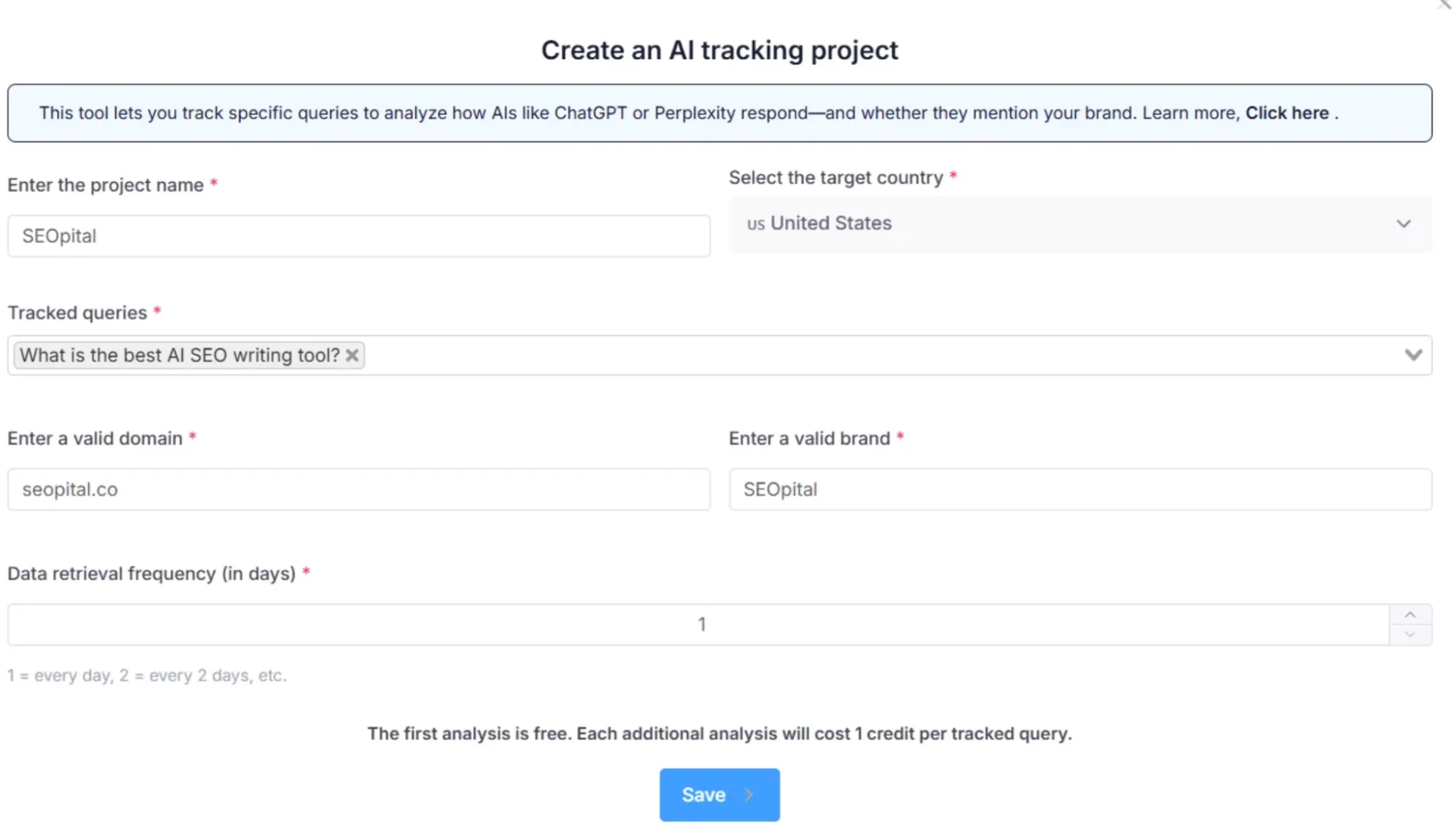
Best for: Turning insights into content creation.
SEOpital focuses on AI-assisted content optimization rather than AI visibility tracking. It acts like an AI-powered SEO copywriting assistant or content strategy partner, helping you generate new content, cluster keywords, enrich existing pages, improve internal linking, and optimize on-page elements for better search performance.
- Key features: Keyword research, clustering, internal linking checks, duplicate content detection, semantic optimization, content generation
- Use case: A travel blog tracking “eco-friendly vacations” can generate briefs, apply structured data, and improve inclusion in Google AI Overviews.
- Pricing: Free trial available; tiered plans (pricing varies).
Pros:
- Combines content creation + optimization
- Helpful schema and technical SEO checks
- Great for small teams needing execution support
Cons:
- Not as advanced in visibility dashboards as Nightwatch
- No deep sentiment tracking like Scrunch
- Limited competitor insights compared to Peec AI
Insider tip: Pair SEOpital with Knowatoa’s query-level data. Knowatoa spots missed prompts, SEOpital helps create optimized content to target them.
10. Semrush AIO
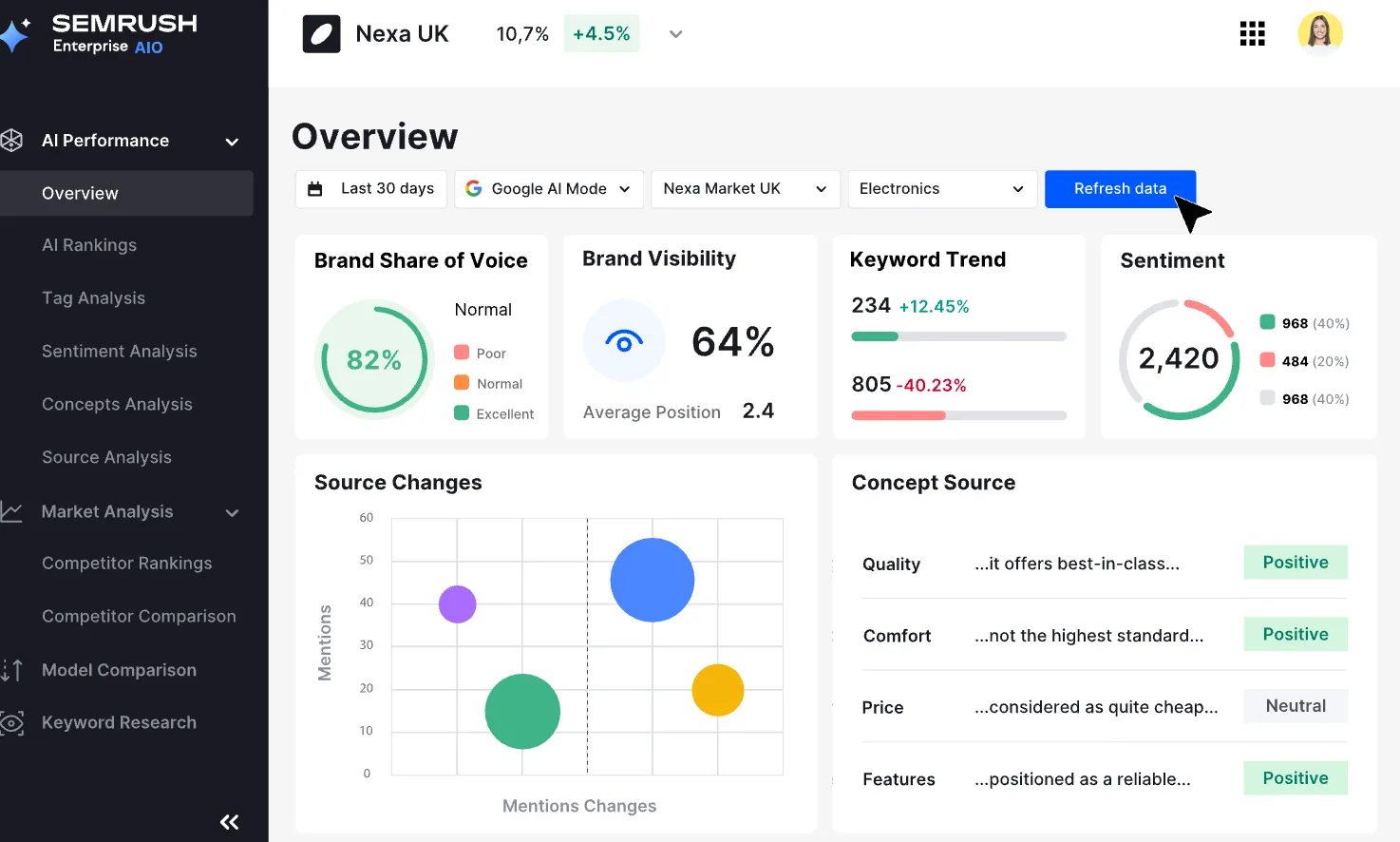
Best for: Enterprise SEO + AI search visibility at scale.
Semrush AIO extends the well-known SEO platform into Generative Engine Optimization. It combines prompt discovery, AI mentions tracking, and brand sentiment analysis with deep integrations (Google Analytics 4, Google Search Console, exports, and APIs).
- Key features: Prompt discovery, sentiment/citation analysis, competitor benchmarking, API integrations
- Use case: A Fortune 500 retailer can monitor whether Bing Copilot cites them for “best furniture stores,” compare competitors’ strengths, and adjust content strategy accordingly.
- Pricing: Custom enterprise pricing only; Semrush does not publicly list standard monthly tiers for AIO plans. Contact sales for a demo and tailored quote.
Pros:
- Most comprehensive tool in this list
- Trusted SEO brand with robust integrations
- Combines SERP + AI visibility at scale
Cons:
- Higher learning curve
- Pricey for small teams compared to Otterly or Rankscale
- Can feel overwhelming for simple monitoring needs
Insider tip: Use Semrush AIO’s citation logs for link building. When AI systems mention you without linking, outreach can reclaim those mentions and boost both search optimization and AI search visibility.
How to Choose the Right LLM Optimization Tool
Picking the right LLM optimization tool really comes down to your goals, team size, and resources. Traditional search engines give you clicks and impressions that you can monitor with Google Search Console, Ahrefs, or alternatives.
But with AI-powered search engines, your content might be summarized without a link, so you need a way to measure AI mentions and brand visibility directly. You may also want a tool that helps you write content that gets picked up by LLM immediately.
- Solo creators or small teams: Tools like Otterly AI, SEOpital Basic, or ZipTie.dev keep things lightweight. Otterly runs GEO audits and quick fixes, SEOpital blends content optimization with creation, while ZipTie.dev helps surface technical content gaps.
- Agencies: Platforms such as Rankscale AI, Keyword.com, or Peec AI make more sense. Rankscale is budget-friendly for multi-client setups, Keyword.com links keyword search volume to AI search results, and Peec AI excels at regional benchmarking.
- Enterprise teams: Solutions like Profound, Knowatoa, or Semrush AIO deliver at scale. Profound offers advanced brand sentiment and hallucination reporting, Knowatoa highlights missed queries, and Semrush AIO combines prompt discovery with deep competitor analysis.
Checklist when choosing a tool:
Stay Visible in the Age of AI Search with Bluethings
Large Language Models are now the gatekeepers of discovery. They shape how audiences see and trust your brand. Traditional SEO once revolved around blue links and SERP domination.
Still, with AI-powered search engines like ChatGPT, Google Gemini, and Perplexity, your content can power AI-generated answers without driving a single click. Or even without ranking on the first page of Google.
That’s why LLM optimization and Answer Engine Optimization have become essential.
The ten tools we’ve reviewed help you monitor brand mentions, track AI search results, and uncover content gaps. Whether you need audits, brand sentiment checks, competitor benchmarking, or full AI visibility dashboards, there’s a fit for every team size and budget.
Our advice? Start small.
Test one or two tools on a free trial, measure your current visibility score, and use the insights to guide your content strategy, reputation management, and performance reporting. These tools can indeed turn fleeting AI mentions into lasting authority in the era of AI search, but only if you use them correctly.
Ready to stay visible in AI search?
At Bluethings, we help brands adapt to AI-powered search engines with SEO management, content optimization, and link building. Get in touch to see how we can help you turn AI citations into lasting authority.
FAQs
Can LLM optimization tools improve my rankings in ChatGPT or AI Overviews?
Not directly. They can’t guarantee top spots, but they show how often you appear in AI-generated answers and what factors help, like structured data, freshness, or internal linking. Tools such as Nightwatch and Semrush AIO connect keyword rankings with AI mentions to guide smart optimizations.
What’s the difference between SEO tools and LLM tracking tools?
Traditional SEO tools measure clicks, impressions, and keyword rankings in search engines. LLM trackers focus on AI search results. This includes brand mentions, sentiment, and citations. Keyword.com bridges both, while Scrunch AI and Profound lean into brand visibility inside AI-powered search engines.
Which AI models do these tools typically monitor?
It varies. Lighter tools like Otterly AI cover ChatGPT, Gemini, and Perplexity. Enterprise platforms like Profound and Semrush AIO add Claude, Google AI Overviews, Copilot, and even emerging models like DeepSeek. Always check multi-model tracking before subscribing.
How do I know if an LLM is misrepresenting my brand?
Pick tools with sentiment/hallucination detection. Scrunch AI and Profound, for example, flag misinformation or negative tone. These are vital for industries like healthcare or finance.
Are these tools only for enterprise teams or SEO experts?
Not at all. Options like Otterly AI, SEOpital, and Knowatoa AI work well for small teams and solo creators (often with free tiers). Agencies or enterprises needing deeper exports and global coverage tend to use Peec AI or Semrush AIO.



